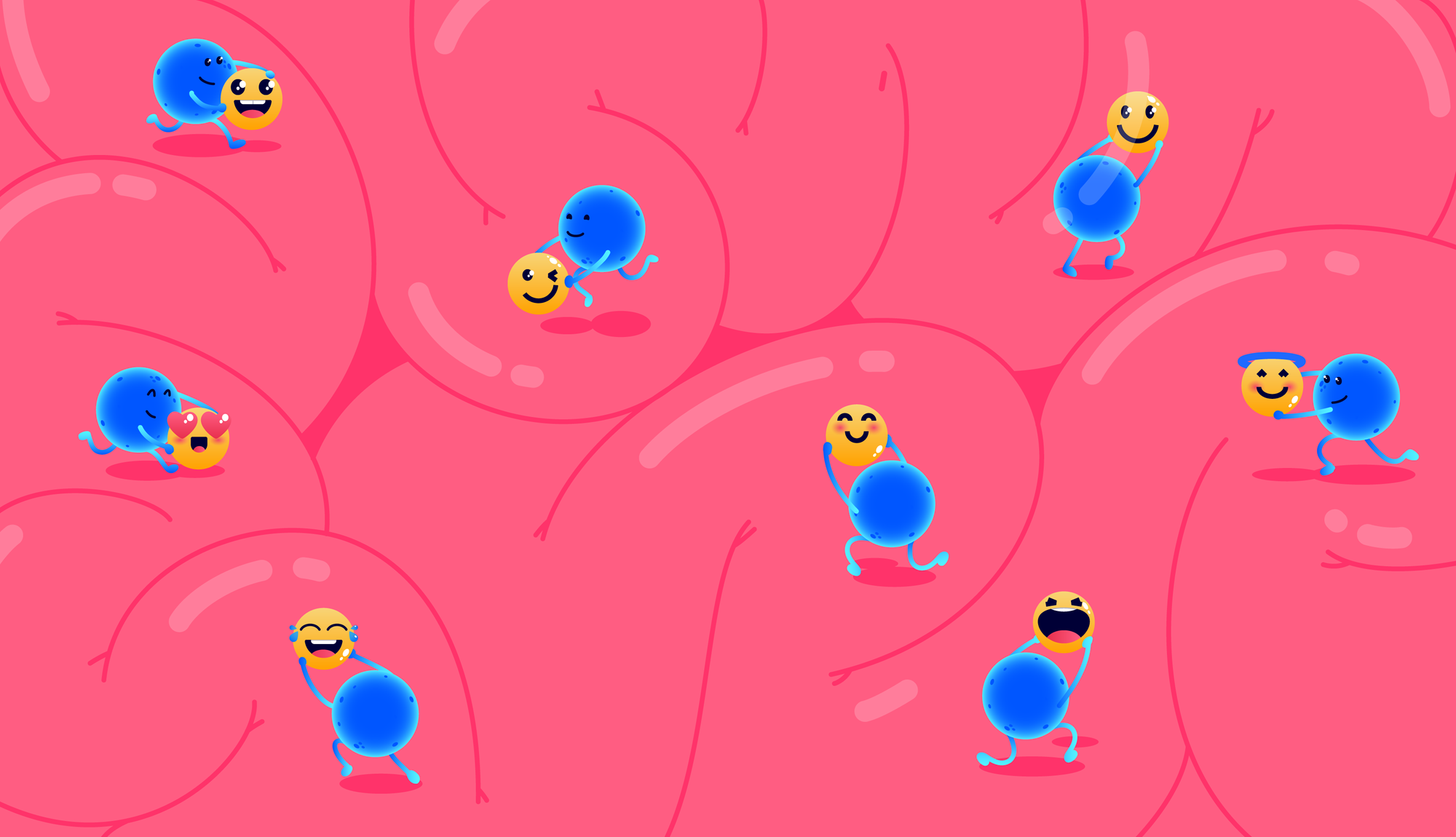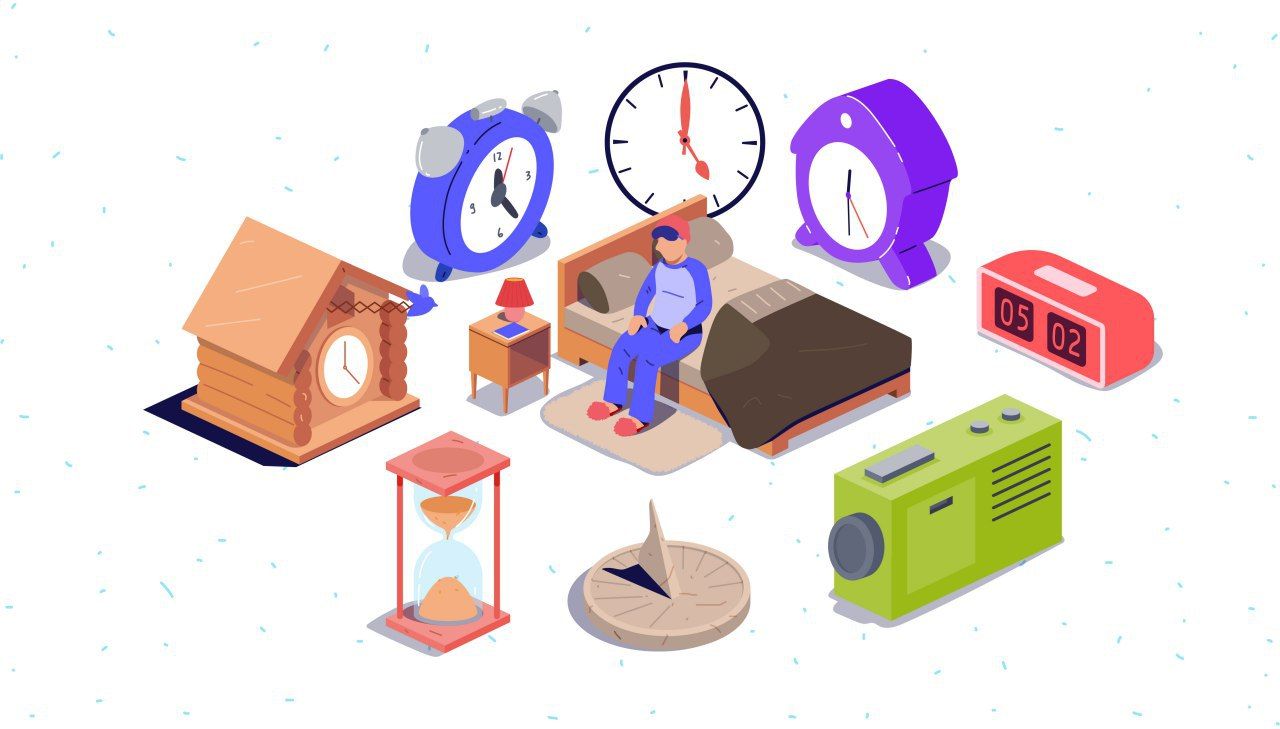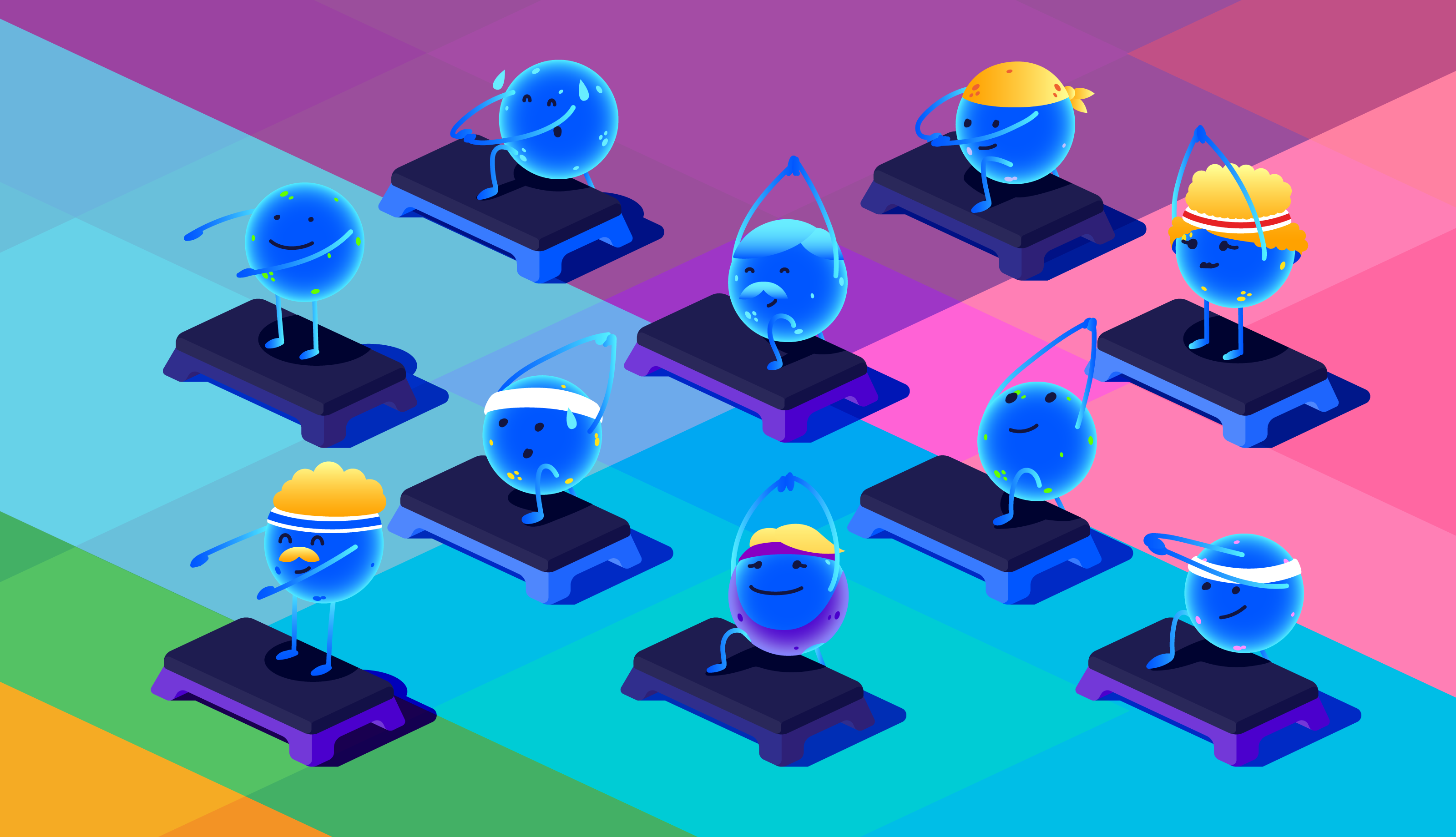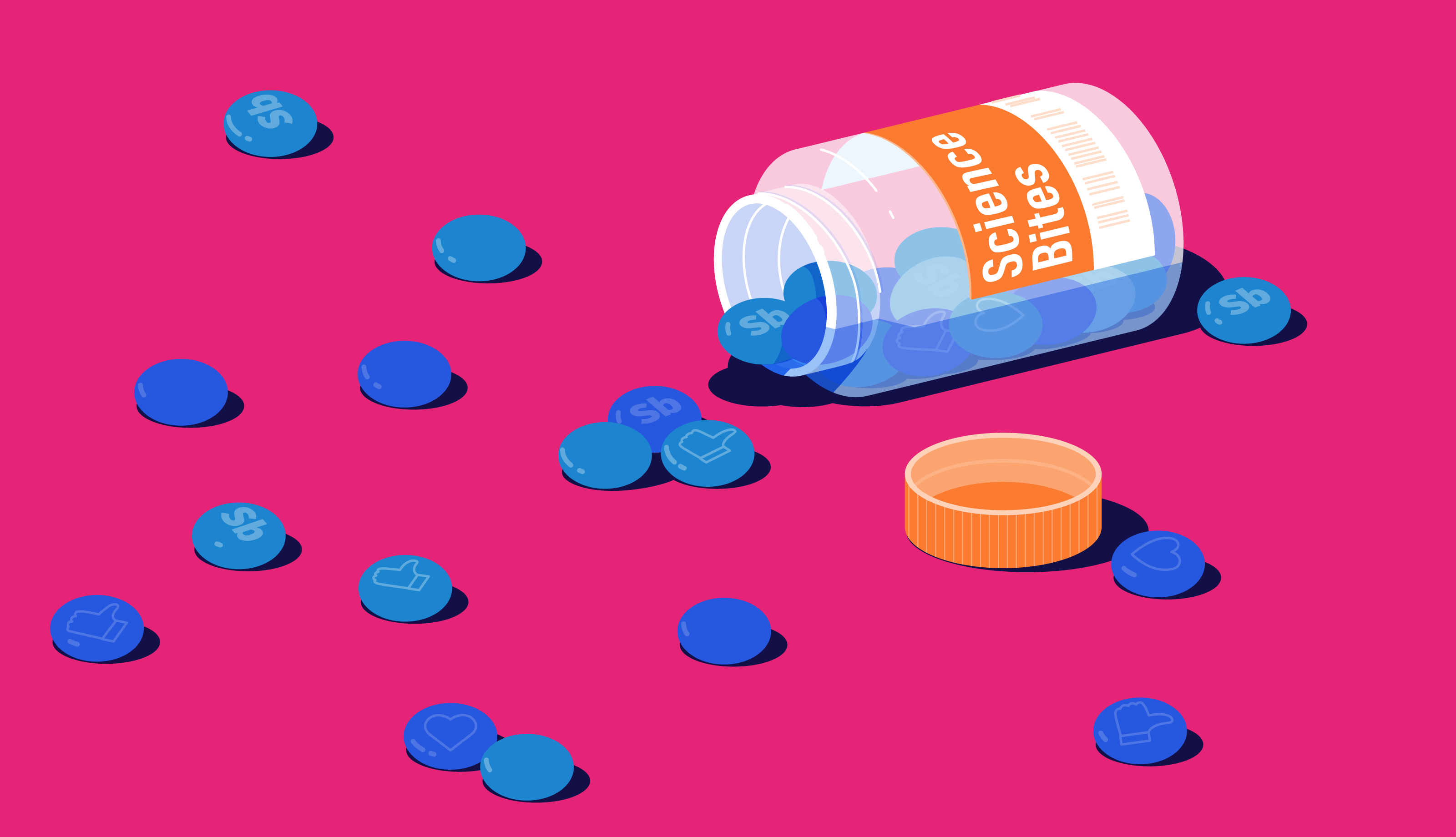Serotonin, dopamine, oxytocin, and endorphins are famously happy hormones that promote positive feelings like pleasure, happiness, and even love.
Hormones and neurotransmitters are involved in lots of essential processes, like heart rate and digestion, but also your mood and feelings. They are the body’s chemical messengers, and some of them are known for their ability to help people bond, feel joy, and experience pleasure.
Table of contents
1. What are happy hormones and neurotransmitters?
2. The list of happy chemicals
3. Serotonin, the feel good hormones in your gut
4. Foods that increase serotonin
5. Oxytocin, the cuddle hormone
6. How to increase oxytocin naturally
7. Dopamine, the motivational molecule
8. Dopamine and disease
9. Can foods increase dopamine?
10. Endorphins: the runner’s hormone
11. Happy hormones: the take-home
Understanding the importance of these happy chemicals in the brain and body and their impact on mental health means you can take active steps to improve their levels naturally. In other words, happy hormones mean a happy you!
What are happy hormones (and neurotransmitters)?
Hormones are chemicals produced by various glands in the human body whose primary function is to communicate between two glands or between a gland and an organ.
The hormones in your body rise and fall throughout the day. For example, a surge of cortisol in the morning wakes you up, while another hormone, melatonin, helps to get you ready for bed in the evening. And then there are the hormones that tell you you’re hungry, full, happy, and sad.
There is a specific system in the body controlling the production and release of hormones into the bloodstream called the endocrine system. It is a network of glands which runs throughout the body, with each gland making at least one hormone, that is controlled by the pituitary gland in the brain.
There are some hormones which are involved in the regulation of mood, pleasure, bonding, and even pain relief. But that’s not all. These chemicals are critical components of your health, like growth and development, metabolism, and reproduction too.
Sometimes, these hormones are called neurotransmitters. There’s really no big difference between hormones and neurotransmitters, except for where they act. Happy hormones travel through the bloodstream to different organs and tissues, while happy neurotransmitters only occur in the brain and central nervous system where they communicate directly via neurons.
☝TIP☝Boost your microbiome to get those gut hormones balanced. Take theAtlas Microbiome Test.
What chemical makes you happy?
The body has many feel good hormones that boost mood and promote general wellbeing in many ways. Some are able to alleviate anxiety and prevent depressive symptoms while others trigger pleasure, joy, bonding, and trust. Here are the main happiness chemicals in your body:
| Chemical | Mood function |
| Serotonin | mood stabiliser, wellbeing, happiness |
| Dopamine | pleasure, motivational role in brain’s reward system |
| Oxytocin | Bonding, love, trust |
| Endorphins | Pain relief, runner’s high, relaxation |
Serotonin: the feel good hormones in your gut

The original happy hormone – aka serotonin – is essential for mood, digestion, sleep, brain function, and circadian rhythm. Funnily enough, up to 90% of your body’s serotonin is produced in the gut where it can act in two different ways:
- a neurotransmitter that communicates via the enteric nervous system in the gut
- released into the bloodstream where it operates as a hormone on the body’s tissues
A recent revelation is that your gut bacteria participate in your serotonin production. Crazy as it sounds, the trillions of microbial cells in your colon actually have the ability to stimulate the cells that make serotonin.
Another factor that influences serotonin production is the availability of its precursor, tryptophan, a substance that your gut can turn into serotonin. Tryptophan is an essential amino acid, which means you must get it from your diet because the body is unable to make it.
These fascinating findings suggest that you may be able to support your own mental wellbeing by taking care of your gut bacteria and your diet. After all, one of the most influential factors on the quality of your microbiome is diet, and diet is also known to play a role in mental health.
A diet of fiber-rich plant foods with meat and fat in moderation is associated with more abundant bacteria that produce acetate and butyrate. A balanced whole-food diet has also been shown to promote mental health. On the other hand, people who follow the Western diet (refined carbohydrates, fast food, and animal products) tend to have less beneficial bacteria.
Serotonin remains a rather elusive chemical for researchers who note that it seems to be “involved in everything but responsible for nothing”. The same goes for mood too. Low serotonin has been noted in depression, but increasing serotonin levels in depressed people doesn’t reliably work, and there are some serious side effects.
☝Is serotonin an endorphin?☝ No. They are both hormones and neuro-signalling molecules, but they have different functions.
Foods that increase serotonin
You can’t eat serotonin, but you can boost serotonin happiness with food in two ways. Firstly, you can add more prebiotic foods to your diet that support the good bacteria who produce short-chain fatty acids.
| Foods for your gut microbiome | ||
|---|---|---|
| apples | citrus | mushrooms |
| barley | cold potato | oats |
| beetroot | cranberries | onions |
| berries | garlic | rye |
| blackberries | Jerusalem artichoke | wheat |
| chicory | legumes | pasta |
In addition to that, you can add more foods that naturally contain tryptophan, the essential amino acid the body uses to produce serotonin. Just remember that your body needs about 30g of fiber from food each day, and to consume meat and fats in moderation. This will help keep your body and gut microbes balanced.
| Foods that are rich in tryptophan |
|---|
| sunflower seeds | spirulina | cod, salmon |
| soybeans | potatoes | eggs |
| oats | milk | chickpeas |
| wheat | cheese | beef | quinoa | chickpeas | chicken/turkey |
Oxytocin, the cuddle hormone
Oxytocin is a hormone that promotes bonding and trust, and it is particularly active during childbirth where it stimulates contractions. One of its lesser-known, but equally important, functions is as a neurotransmitter that helps regulate stress responses and calm the nervous system.
It’s been pinpointed in human bonding, generosity, and establishing trust, while other studies show that it might be what makes some romantic relationships work. Indeed, higher blood oxytocin levels have been linked to greater perceived love, responsiveness, and gratitude in couples.

Oxytocin secretion happens in response to stimuli perceived by the brain, which is carefully monitoring your environment for threats (and signs of safety) using your ears, eyes, taste, touch, and smell. It’s produced in response to touch and even the right kind of eye contact, but also in times of stress to counterbalance the effects of cortisol.
In recent years, the scientific community has discovered that oxytocin plays a much wider role than initially ascribed, regulating the immune system, healing, and even pain perception. You won’t be surprised then to discover that your gut bacteria have got their finger in this pie too.
Although most of the studies have been conducted in mice, it was shown that gut microbes can stimulate oxytocin production, thus promoting wound healing and muscle health, leading some to suggest that this chemical might contribute to healthful longevity.
☝FACT☝The probiotic bacteria, L. reuteri, was shown to increase the body's natural production of wound-healing oxytocin.
How to increase oxytocin naturally
If you’re wondering how to release oxytocin, it’s pretty simple. There is no oxytocin food, but that’s okay because oxytocin is released when you engage in caring relationships and have a loving community around you.
- romance
- caring relationships
- soft, friendly touch
- friendship
- pets
Although there is an oxytocin supplement in the form of a nasal spray, it’s primary use is for problems related to child birth and in psychiatric research. Always consult your doctor before taking any kind of supplement.
Dopamine, the motivational molecule
Dopamine is another hormone that makes you happy while also keeping you alive and alert. It’s involved in a wide range of activities, and a number of severe conditions are associated with the dysfunction of the dopamine system. Here are some systems it’s involved in:
- motor control and cognitive function
- the brain’s motivation and reward system
- decision-making and impulse control
- memory and attention
- maternal and reproductive behaviours
This chemical is part of the brain’s reward system - it’s what gives you pleasurable sensations and keeps you coming back for more. Dopamine is considered to be the motivational cog in this system, and it’s naturally released when you perceive food or sex, but before you consume it.
☝FACT☝Dopamine is the active neurotransmitter in addictions to substances (drugs and alcohol) and behaviours (gambling, sex).
Dopamine and disease

Approximately 50% of all your dopamine is produced in the gut, and early studies in rodents suggest that the microbiome may be somehow involved. This potential relationship came about after research in Parkinson’s disease, a neurodegenerative disease caused by problems with dopamine transmission in nerve cells.
Clearly, it’s still early days in this field, but there is an important take-home message here. The gut microbiome constitutes a pivotal area for long-term health, which is why some researchers even consider the trillions of bacterial cells in your colon to be a “new organ” rather than an alien colony.
Caring for your gut microbiome can contribute to your mental wellbeing and longevity because there’s a second “brain” in your gut (the enteric nervous system), and it is nearly just as important as your actual brain when it comes to producing the chemicals that make you happy and keep you healthy.
☝FACT☝In mice, L. reuteri supplementation was shown to improve depressive behaviour and improve the body’s serotonin metabolism.
Can foods increase dopamine?
The decline in dopamine signalling with age has led to research into how to solve this problem. Dopamine can’t be found in food, so you can’t eat it, which is why scientists looked to its precursor molecules for answers.
As it happens, the body can turn tyrosine - an amino acid - into dopamine via a complex chain of reactions. Tyrosine is found in food, and many online sources tell people to eat tyrosine-rich foods to boost their dopamine levels.
However, the reality is somewhat different. Studies looking at tyrosine supplementation to support dopamine signalling in the brain offer very different results. Some indicate that it can help but only when dopamine function is intact, while others show that it doesn’t, and may even be detrimental in older people.
☝Is dopamine an endorphin?☝ No, endorphins naturally relieve pain and cause euphoria. Dopamine happiness comes from the brain’s reward system.
Endorphins: the runner’s hormone
Endorphins make you happy, but not in the way you might think. Endorphins are hormones and neuro-signalling molecules that function as painkillers. They inhibit the transmission of pain signals in the central nervous system by binding to opioid receptors (the body’s natural morphine).
Boost your endorphins (and cardio fitness) with running
Endorphins and dopamine are often confused because each one is a chemical that makes you happy in the broad sense of the term. However, they are in some ways related because, when endorphins bind to receptors of the central nervous system, dopamine (the pleasure hormone) is released.
Yet, happy endorphins didn’t rise to fame because they block pain signals, but because they induce euphoria. That’s right, the ubiquitous “runner’s high” is caused by a big rush of endorphins. Plus, the potent combination of endorphins and dopamine explains why people get “hooked” on running.
Happy hormones: the take-home

These hormones or neurotransmitters are involved in promoting a happy mood and positive feelings, and you might know them by different names too. For example, serotonin is also called the happiness hormone, dopamine is a feel-good hormone, and oxytocin is the cuddle hormone.
The gut microbiome has a positive role in the production of neurotransmitters, including dopamine and serotonin. These not only allow neurons to communicate with each other, but also connect the nervous system with the gut. In other words, a happy gut means a happy mind!
There are some natural ways to increase your levels of dopamine, serotonin, and oxytocin which will boost your mood, emotions, and even cognitive function. Activities like exercise, eating a meal with loved ones, and increasing your intake of prebiotics and probiotics are all beneficial.
- Algoe SB et al., Oxytocin and Social Bonds: The Role of Oxytocin in Perceptions of Romantic Partners’ Bonding Behavior, 2017
- Briguglio, M et al. Dietary Neurotransmitters: A Narrative Review on Current Knowledge, 2018
- Bloemendaal M et al., Neuro-Cognitive Effects of Acute Tyrosine Administration on Reactive and Proactive Response Inhibition in Healthy Older Adults, 2018
- Carabotti, M et al. The Gut-Brain Axis: Interactions Between Enteric Microbiota, Central and Enteric Nervous Systems, 2015
- Carpenter, S. That Gut Feeling, 2012
- [Clarke, G et al.] Minireview: Gut Microbiota: The Neglected Endocrine Organ, 2014](https://academic.oup.com/mend/article/28/8/1221/2623221)
- Carhartt RL & Nutt DJ, Serotonin and brain function: a tale of two receptors, 2017
- Erdman SE & Poutahidis T, Microbes and Oxytocin: Benefits for Host Physiology and Behavior, 2016
- Erdman SE, Microbes, Oxytocin, and Healthful longevity, 2014
- Gonzalez-Arancibia et al., Do your gut microbes affect your brain dopamine?, 2019
- Herr, N et al. The Effects of Serotonin in Immune Cells, 2017
- Jenkins, T, A et al. Influence of Tryptophan and Serotonin on Mood and Cognition with a Possible Role of the Gut-Brain Axis, 2015
- Jongkees BJ et al., Effect of tyrosine supplementation on clinical and healthy populations under stress or cognitive demands--A review, 2015
- Klein MO et al., Dopamine: Functions, Signaling, and Association with Neurological Diseases, 2019
- Lachance L & Ramsey D, Food, Mood, and Brain Health: Implications for the Modern Clinician, 2015
- Reigstad, C, S et al. Gut Microbes Promote Colonic Serotonin Production Through an Effect of Short-Chain Fatty Acids on Enterochromaffin Cells, 2015
- Rekdal, V, M et al. Discovery and Inhibition of an Interspecies Gut Bacterial Pathway for Levodopa Metabolism, 2019
- Ridaura, V and Belkaid, Y. Git Microbiota: The Link to Your Second Brain, 2015
- Ruining X et al., Oral treatment with Lactobacillus reuteri attenuates depressive-like behaviors and serotonin metabolism alterations induced by chronic social defeat stress, 2020
- Uvnäs-Moberg, K et al. Self-Soothing Behaviours with Particular Reference to Oxytocin Release Induced by Non-Noxious Sensory Stimulation, 2014
- Volkow, N, D et al. The Dopamine Motive System: Implications for Drug and Food Addiction, 2017
- Yano, J, M et al. Indigenous Bacteria from the Gut Microbiota Regulate Host Serotonin Biosynthesis, 2015
- You and Your Hormones. Hormones, 2020
Join our
community
Read this next
Featured topics





















